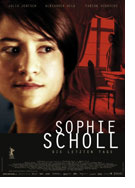

Opening 24 Feb 2005
Directed by:
Marc Rothemund
Writing credits:
Fred Breinersdorfer
Principal actors:
Julia Jentsch, Fabian Hinrichs, Gerald Alexander Held, Johanna Gastdorf, André Hennicke
Sophie Scholl and her brother Hans are considered heroes today as organizers of The White Rose (an anti-Nazi resistance group) while students at the University of Munich. This film directed by Marc Rothemund is an emotional and sympathetic account of their last five days. An early scene shows Sophie, stoically portrayed by Julia Jentsch, shoving their leaflets over the railing so that they float down into the lobby just as the students are about to leave their classes. As the University was under the supervision of the SS troops, this was a very courageous but fatal act. Sophie, Hans (Fabian Hinrichs), and another member of The White Rose were all interrogated by the Gestapo, sentenced to death and executed.
Sophie’s interrogation is presented as a debate between two competing ideologies – a passionate humanism opposing a rigid National Socialist dogma. Their anti-fascist arguments were written in six leaflets that were distributed on campus as well as throughout the city. They tried to encourage the German people to passively resist the Nazi government. When the three are sentenced before the sea of brown Nazi uniforms, un-swayed by their show of strength and conviction, it is effectively disturbing. Where did the German people stand?
Another film which approached this sensitive topic of resistance met its own resistance. Michael Verhoeven was twice denied support by the German Ministry of the Interior for his 1982 film Dare to Defy – The White Rose. During its filming in Munich the police were called continually to stop the filming and arrest the actors. One 50-year-old man stated that “Hitler would have had you all hanged.” Other films on the Scholls are Five Last Days, a 1983 film from Adlon and The Nasty Girl in 1989, again by Verhoeven. Angelica Huston is planning to direct another film about The White Rose.
This is a story that should rightfully be told, again and again, to encourage all activists and members of resistance movements who are so easily ignored and even ridiculed by the mainstream public and media. As we all are challenged by the continuing restriction of our own civil rights by authoritative governments, Sophie’s message should remind us that apathy is complicity.
There have also been several books written about the Scholls and the White Rose:
• The Students Against Tyranny – The Resistance of The White Rose – Munich 1942, 43 by Inge Scholl, younger sister of Hans and Sophie. She includes personal memories as well as the texts of the six leaflets.
• At the Heart of The White Rose: Letters and Diaries of Hans & Sophie Scholl by Inge Jens.
• German Women Recall the Third Reich by Alison Owings, about the woman who headed up the U.S. branch of The White Rose and whose husband smuggled leaflets out of Germany.
• The Short Life of Sophie Scholl by Herman Vinke. (Patricia Ritz)
This intimate docu-drama portrays the last six days of Sophie Scholl’s life, February 17–22, 1943; this short time spans the commitment of her "crime", imprisonment, shockingly swift trial and execution by guillotine, along with her brother Hans (Fabian Hinrichs), both members of the White Rose resistance movement. For this very intensely personal account of young Sophie's (Julia Jentsch) emotional rollercoaster, and of her amazing stamina and resourcefulness, director Marc Rothemund tried to keep his film close to the known facts. Archives previously suppressed in the DDR were open to the public with the 1989-90 German reunification. The protocol of the Gestapo on The White Rose was used in the screenplay by Fred Breinersdorfer, author and lawyer, who also writes for the "Tatort" and "Anwalt Abel" TV series.
The actual rooms where Sophie and Hans lived at Fanz-Joseph-Straße in Munich were used for filming. The printing office where The White Rose met no longer exists nor does the Munich Gestapo Headquarters, which was destroyed in 1964. However both were reconstructed from existing detailed architectural plans in Bavaria Studios. Ludwig-Maximilians-University and the Munich Palace of Justice were also filmed onsite. Sophie has been called a 20th century Joan of Arc. The film intimately focuses on her, reminiscent of Dreiser’s silent classic The Passion of Joan of Arc which is available on loan at the film library. (Nancy Tilitz)